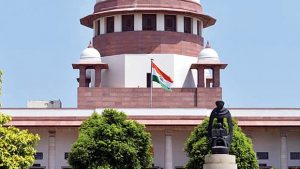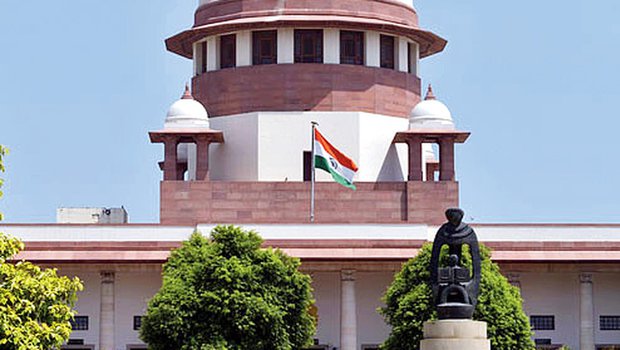 Janjivan Bureau / New Delhi : The Supreme Court said on Wednesday it will hear challenges in October to a government order revoking the autonomy of contested Kashmir, and it allowed Sitaram Yechury, head of the Communist Party of India (Marxist), to visit the region that has been under lockdown for weeks.
Janjivan Bureau / New Delhi : The Supreme Court said on Wednesday it will hear challenges in October to a government order revoking the autonomy of contested Kashmir, and it allowed Sitaram Yechury, head of the Communist Party of India (Marxist), to visit the region that has been under lockdown for weeks.
More than a dozen petitions have been filed in the Supreme Court questioning the legality the action, which the government said was aimed at developing the region at the heart of animosity with Pakistan for decades.
On Wednesday, a panel of judges headed by Chief Justice Ranjan Gogoi, said the court would hear the petitions starting in the first week of October.
The court also ordered the federal government to submit a response within seven days to a plea by Anuradha Bhasin, the editor of the daily Kashmir Times, who has sought a relaxation of a government ban on telephone and internet services in Kashmir since August 5.
Some landline telephone connections that were restored last week. The government has said the restrictions were necessary to maintain law and order, but residents have expressed frustration and anger over the lockdown.
Hundreds of people have been queued up outside a government office in Kashmir’s main city of Srinagar every day to make calls outside the region.
The Supreme Court also allowed Sitaram Yechury to visit Kashmir to meet his colleague, Mohammed Yousuf Tarigami, a former lawmaker who is among hundreds of political workers and activists that the government has detained since the crackdown began.
Yechury was turned back from Srinagar airport when he tried to visit his colleague on August 9.
Separatist militants have been battling Indian security forces in Kashmir for years. India accusesd Pakistan of stoking the insurgency. Pakistan denies doing so.
The nuclear-armed rivals both rule parts of the divided Himalayan region but claim it in full.
The revocation of Kashmir’s special status in the constitution means people there will lose exclusive rights to property, government jobs and colleges places and open them up to all Indians.
Prime Minister Narendra Modi says the reform will open up Kashmir’s economy to the benefit of all.
“We will refer the matter to a five-judge Constitution bench,” the bench, also comprising justices S A Bobde and S A Nazeer, said, while not accepting the arguments that the issuance of notice would have a “cross-border repercussion”.
The attorney general said whatever was being said by the court was sent before the United Nations (UN).
As the counsel appearing for both sides were involved in arguments and counter-arguments, the bench said, “We know what to do, we have passed the order, we are not going to change.”
It also said all the matters would be listed for hearing in the first week of October.
The first petition challenging the presidential order scrapping Article 370 was filed by advocate M L Sharma, who was later joined by another lawyer from Jammu and Kashmir, Shakir Shabir.
National Conference (NC), a prominent political party from Jammu and Kashmir, filed a petition on August 10, contending that the changes brought in the status of the state had taken away the rights of its citizens without their mandate.
Arguing that the legislation approved by Parliament and the orders issued by the President subsequently were “unconstitutional”, the petition prayed for those to be declared as “void and inoperative”.
The petition was filed by Mohammad AKbar Lone and Justice (retd) Hasnain Masoodi, both Lok Sabha members of the NC.
Lone is a former speaker of the Jammu and Kashmir Assembly and Masoodi is a retired judge of the Jammu and Kashmir High Court, who ruled in 2015 that Article 370 was a permanent feature of the Constitution.
There are other petitions challenging the Centre’s decision to abrogate Article 370, including a plea filed by a group of former defence officers and bureaucrats, who have sought directions declaring the presidential orders of August 5 as “unconstitutional, void and inoperative”.
The plea was filed by professor Radha Kumar, a former member of the Home Ministry’s Group of Interlocutors for Jammu and Kashmir (2010-11), former IAS officer of Jammu and Kashmir cadre Hindal Haidar Tyabji, Air Vice Marshal (retd) Kapil Kak, Major General (retd) Ashok Kumar Mehta, former Punjab-cadre IAS officer Amitabha Pande and former Kerala-cadre IAS officer Gopal Pillai, who retired as the Union home secretary in 2011.
A petition has also been filed by bureaucrat-turned-politician Shah Faesal, along with his party colleague and former Jawaharlal Nehru University Students’ Union (JNUSU) leader Shehla Rashid.
There are other petitions challenging the Centre’s decision on Article 370.

















